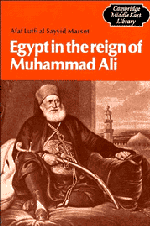Book contents
- Frontmatter
- Contents
- Dedication
- Preface
- Note on transliteration
- 1 Egypt under the mamluks
- 2 Muhammad Ali the man
- 3 A country without a master
- 4 Master in his own house
- 5 Family, friends and relations
- 6 Internal policies
- 7 Agricultural changes
- 8 Industry and commerce
- 9 Expansion to what end?
- 10 The undoing: Muhammad Ali and Palmerston
- 11 The aftermath
- 12 Conclusion
- Notes
- Glossary of Arabic and Turkish terms
- Select bibliography
- Index
8 - Industry and commerce
Published online by Cambridge University Press: 04 April 2011
- Frontmatter
- Contents
- Dedication
- Preface
- Note on transliteration
- 1 Egypt under the mamluks
- 2 Muhammad Ali the man
- 3 A country without a master
- 4 Master in his own house
- 5 Family, friends and relations
- 6 Internal policies
- 7 Agricultural changes
- 8 Industry and commerce
- 9 Expansion to what end?
- 10 The undoing: Muhammad Ali and Palmerston
- 11 The aftermath
- 12 Conclusion
- Notes
- Glossary of Arabic and Turkish terms
- Select bibliography
- Index
Summary
Dependence on the Nile river, while yielding admirable results in good years, was, alas, a dependence on whimsical or capricious nature, which through floods and droughts, good years and indifferent years showed man how little he controlled his river, and how much lay at the mercy of nature's forces when he was buffeted by catastrophe in bad years. Muhammad Ali was too practical a man to trust wholly to the caprice of nature, and tried to harness the river with the technology of his day. Oriented as he was towards trade and commerce, he must needs develop manufactures in order to have a favourable balance of trade: two planks in the edifice of mercantilist thought. Diversification of investment into industry, trade and commerce was imperative. These were fields that Muhammad Ali understood even better than he did agriculture.
Egypt had always been a cotton-textile exporting country, although it had its ups and downs. It had imported all its raw silk and some of its cotton from Syria. In return Egypt paid for these imports by exporting rice and cereals to the area, and some textiles. Egypt had also exported textiles to France in the early part of the eighteenth century. By the end of the century that market had contracted for various reasons we have already referred to, not least of which may have been the death of textile workers from the plague that ravaged the land by the end of the century.
- Type
- Chapter
- Information
- Egypt in the Reign of Muhammad Ali , pp. 162 - 195Publisher: Cambridge University PressPrint publication year: 1984



